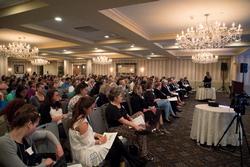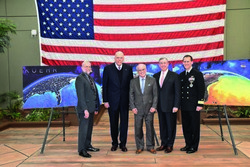The Institute for Global Understanding (IGU) began as The Global Understanding Project (GUP) in late 2001 as a means for Monmouth faculty and administration to push discussion on global engagement for the campus and beyond. Lauded by faculty and students alike, the institute has undergone an unstable past few years after being slated for hiatus by former Monmouth President Paul R. Brown, Ph. D.
Over time, the institute evolved to host the Global Understanding Convention (GUC), facilitate a successful partnership with the United Nations, and create local programming such as Project BAM, a collaboration between IGU, Big Brothers and Big Sisters of Monmouth and Middlesex counties, and Asbury Park High School.
Despite its success and popularity amongst students and faculty alike, the IGU was eventually put on an indefinite hiatus in 2015.
The mystery surrounding the suspension of the IGU has left many Monmouth community members dumbfounded, but new conversations have begun to stir regarding a possible revitalization of the institute.
Nancy Mezey, PhD., Founding Associate Director of the IGU had some thoughts regarding the abrupt hiatus of the institute.
“I believe what happened with the institute, was it being too under-resourced, and the faculty just couldn’t maintain it,” Mezey said. “When President Brown came into the university, he said he wanted a much bigger area of global education which was great and it’s what we have now, but it seemed the administration could never really figure out where IGU fit into that plan.”
A lack of resources for the IGU from the administration seemed to be a probable theory as to why the institute collapsed, as Marina Vujnovic, Ph.D., former IGU Director and an Associate Professor of Communication, explained.
“We had grown the program, and the university had seemed unable to provide the resources for us to continue,” Vujnovic said.
“I felt like after all these years of this wonderful program, maybe if I stepped up as a Director we could pressure administration to help us fund this wonderful institute that we all strongly believed in,” she added.
In the spring of 2015, the IGU held their last Global Understanding Convention. According to Vujnovic, faculty members associated with IGU sat down and discussed the possibility of moving IGU forward, but there was “not much traction on the administration’s part.”
The IGU granted students such opportunities as internship programming with the United Nations, presenting their work at the Global Understanding Convention, and working closely with Monmouth faculty members.
Amanda Kontor, a Monmouth graduate with a degree in Communications, was heavily involved with the IGU during its active years, and stressed the importance of current Monmouth students deserving the right to engage in similar experiences.
“When I reminisce about my time at Monmouth, the Institute for Global Understanding and its annual Global Understanding Convention are among the first things that come to mind,” Kontor said. “I loved being a part of the institute because it meant having to opportunity to discover new global issues and perspectives, expand my worldview, and celebrate diversity.”
Kontor took advantage of her time with the IGU, becoming a Global Ambassador who facilitated sessions during the Global Understanding Convention, as well as serving as one of IGU’s Youth Representatives to the United Nations for a one-year term.
“Without the IGU, students are missing out on unique opportunities to engage in thought-provoking discussions about world issues and develop the critical thinking, understanding, and other skills they need to become global citizens in our increasingly globalized world,” Kontor said. There’s no question that the IGU should return. Monmouth is such a wonderful community in itself, but the IGU connected it to the greater world community.”
Joanne Jodry, Ed.D., an Assistant Professor of Humanities and Social Sciences, who helped facilitate an advisory program in connection with IGU, spoke of the importance towards globalization’s positive effects on students’ behavior in the world.
“Exposure to the institute causes students to be less judgemental and more accepting of other ways,” Jodry said. “One of the goals is to work with different people on an equal level. Being exposed to things gets you off of the, ‘this is the one way of thinking that’s right’, and thinking there’s one way for a lot of things is what gets in trouble on every level.”
On May 18, 2017, a proposal spearheaded by faculty members Rekha Datta, Mihaela Moscaliuic, Tom Pearson, Karen Schmelzkopf and Marina Vujnovic detailed a plan to revitalize the IGU as well as the GUC.
“It is part of the mission of Monmouth University to offer opportunities for students and the community ‘to become engaged citizens in a diverse and increasingly interdependent world,’” read the first line of the proposal. “For more than a decade, IGU’s programming captured and gave expression to this mission in a direct and efficient manner.”
The future of the IGU remains to be seen, as the logistics of reinstating the institute require a new location as well as willing faculty members to facilitate it. However, the conversation around the return of IGU continues to spread with each day, and faculty are just as excited as the students.
“When faculty had the opportunity to discuss the things we might want to see on campus, IGU is always mentioned as something we’d like to do again,” Mezey said. “So here we are, breathing life into it. I’m really excited to see where it goes.”



